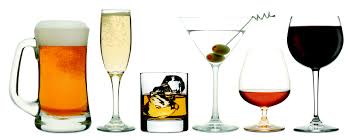Bariatric Realities – Medical Professionals’ Guidelines about Alcohol Use & WLS

Bariatric Realities – Medical Professionals’ Guidelines about Alcohol Use & WLS
I know I said my next article was going to be on causes of obesity, but I got carried away tonight doing some investigating about the professional medical guidelines for alcohol use after weight loss surgery. In summary, the gist of the recommendations are: “Patients undergoing bariatric surgery should be screened and educated regarding alcohol intake both before and after surgery… patients should be made aware that alcohol use disorders (AUD) can occur in the long term after bariatric surgery.” (From: http://asmbs.org/resources/alcohol-use-before-and-after-bariatric-surgery.)
Well, now. Those are some non-specific medical recommendations by medical professionals who are the predominant leaders and caregivers of the surgical weight loss population. Education and awareness. Hey – I am all about education and awareness. Great things, education and awareness.
And yet, I’m gonna say that as a recommendation, that is a very “PC” non-recommendation recommendation, when one considers that we are talking about 1) ALCOHOL and 2) WEIGHT LOSS SURGERY patients.
Consider these educational nuggets and facts I found that WLS patients really ought to be aware of:
Psychologist Stanton Peele, writes, “readers now know that scientifically, it's not alcohol that causes people to live longer, but it is simply being with others and that they are less socially isolated when they drink that prolongs their lives. After all, alcohol is a toxin.” (italics and bold added) (From https://www.psychologytoday.com/blog/addiction-in-society/201011/science-is-what-society-says-it-is-alcohols-poison.
My comments: Yes – alcohol is a toxin, and that means POISON. Those of us in the medical field really ought to know that people are not supposed to ingest poison. But the recommendations do not say, “Do NOT ingest the toxin, alcohol.” No, no, no… they say be educated and aware.
Dr. Charles S. Lieber, M.D., M.A.C.P., in a publication for the National Institute on Alcohol Abuse and Alcoholism, writes, ““A complex interplay exists between a person’s alcohol consumption and nutritional status,” and … alcohol and its metabolism prevent the body from properly absorbing, digesting, and using essential nutrients” (italics added.) Dr. Lieber does indeed, educate us about the nutritional value of alcohol: “Alcohol would not fall under the category of an essential nutrient because not having it in your diet does not lead to any sort of deficiency. Alcoholic beverages primarily consist of water, pure alcohol (chemically known as ethanol), and variable amounts of sugars (i.e., carbohydrates); their content of other nutrients (e.g., proteins, vitamins, or minerals) is usually negligible. Because they provide almost no nutrients, alcoholic beverages are considered ‘empty calories.’ Therefore, any calories provided by alcoholic beverages are derived from the carbohydrates and alcohol they contain.” (italics added)
My comments: People who have weight loss surgery (other than the band) experience absorption issues to one degree or another. Nutritional deficiency is one of the concerns the medical professionals monitor in the months and years following WLS. We stress to patients the importance of taking vitamin supplements for the rest of their lives to help ensure proper nutritional balance.
And yet, rather than saying, “Alcohol use is unwise after WLS,” or “Don’t drink alcohol after WLS,” the governing body of health professionals for bariatric surgery recommends being “educated” and “aware.”
Is that happening? Are the physicians and surgeons and nutritionists and mental health professionals educating patients and making patients aware that ALCOHOL IS A TOXIN THAT CAN INTERFERE WITH VITAMIN ABSORPTION – and it should not be consumed after weight loss surgery? I can’t answer that, although I know we do this at the programs I work with. If it’s not happening, why not?
Having a background in direct sales, which, ironically, was incredible education for my later career as a psychologist, I was taught to “anticipate the objections.” Many health care professionals may be pooh-pooh’ing the vitamin deficiency issue associated with alcohol, stating it’s only those who drink heavily who are at risk for this type of vitamin deficiency. That information, to the best of my knowledge, is relevant for persons who have not had weight loss surgery. What’s more, we don’t know the extent to which people are drinking many years after WLS. Most of the research, as noted in the ASMBS Guidelines/Statements entitled ASMBS position statement on alcohol use before and after bariatric surgery, states, “The existing studies do not present a uniform picture regarding the overall prevalence of lifetime or current alcohol use disorders (AUD) in patients seeking bariatric surgery. The vast majority of the existing literature is retrospective, with small sample sizes, lack of control groups, and low response rates. There are also varying definitions of alcohol disorders (“high-risk” versus “misuse” versus “abuse/dependence”) in the bariatric surgery literature.” In other words, this research does provide some information, but remember, we don’t really know that much because there isn’t enough research on enough people over a long enough period of time. We don’t then, know the actual affect that alcohol use has on vitamin absorption for WLS patients. We DO know that vitamin deficiency is a concern, so WHY aren’t we telling people not to drink?
Not only is alcohol a toxin for our bodies, “Alcohol is actually classified as a drug and is a known depressant. Under this category, it is the most widely used drug in the world. According to the National Institute of Alcohol Abuse and Alcoholism (NIAAA)” (italics and underling added). http://www.medicinenet.com/alcohol_and_nutrition/article.htm
My comments: I am literally chuckling now at the absurdity of this situation. The situation being the medical professionals, all having a code of ethics that reflects the “do no harm” sentiment, ignoring potential harm for their patients. Please note that we would all consider alcohol as being “empty calories” and having sugar/carbohydrates and certainly no protein.
PLEASE let it be the case that the mental health practitioners around the world who deal with surgical weight loss patients are telling them, “Don’t eat empty calories. Eat a lot of protein. Limit the simple carbs and sugar. And refrain from consuming your calories from liquids. NO STARBUCKS. BUT, HEY - GO AHEAD AND DRINK THOSE SUGAR/CARB LADEN, EMPTY, NUTRITION-ROBBING TOXIC CALORIES IN ALCOHOL, THAT ARE, BY THE WAY, THE MOST WIDELY ABUSED DRUG IN THE WORLD.”
Honestly, that sentence should be the entire article.
But WAIT! There’s MORE!
I really love this last tidbit I’ll share with you. It’s so much nicer for me when I can find it online so it’s not that mean, alcohol-hating Dr. Stapleton being the one to blame!
“The truth is that no one needs alcohol to live, so regardless of what you've heard or want to believe, alcohol is not essential in our diets. Did you know that a glass of wine can have the same calories as four cookies? How about a pint of lager – surprised to hear it’s often the caloric equivalent of a slice of pizza? You do not need to be an alcoholic for alcohol to interfere with your health and life.”
Do you hear this, people in the medical profession? Are you giving the OK for your patients to eat four cookies “now and then,” or “in moderation,” or “not for the first six months, or year after surgery?” Do you realize that you may be DOING HARM by giving your patients “permission” to drink alcohol?
“But our job is not to be the watchdog or decision-maker for people.” Another potential objection to my dismay about the recommendations being for “education” and “awareness,” rather than a direct, “SAY NO TO ALCOHOL” stance. I agree that no one can make the decisions about what people can or cannot do, or what they will or will not do. People in the medical field do tell people things like, “Don’t get that wet or you could get an infection,” “Keep the splint on for the next six weeks if you want to heal properly.” There ARE dos and don’ts that are educational and increase awareness. What’s the real issue that medical professionals don’t take a hard stance on alcohol after WLS? I don’t know. I do know that I did my dissertation on medical doctor’s attitudes toward addiction. Turns out it is much like that of their attitudes toward obesity: many don’t know that much about it, very many do not feel comfortable working with it, and most don’t care about/understand it.
To top it all off, HERE’s the real kicker… Not only do the medical AND some of the WLS organizations not tell people, “Don’t drink alcohol,” THEY PROVIDE ALCOHOL AT THEIR EVENTS!
I can’t say any more.
Connie Stapleton, PhD
Facebook: Connie Stapleton
Twitter: @cstapletonphd
LinkedIn: Connie Stapleton, Ph.D.
Very nicely stated. Thank you for adding your experience! I agree with your psychologist on several points but not on others. I have also had certification as an alcohol and drug therapist for 25 years, so in addition to my 12 years specifically in the field of bariatrics, I have an extensive background in substance abuse. The data is limited about alcohol and WLS. I happen to think the problem is much more extensive than the literature suggests regarding transfer addiction. No matter what, alcohol is and always will be a drug, a toxin and has an effect on the absorption of nutrients. You, and all persons, are free to choose what to eat and drink! I'm very sad to hear about your husband. Please take care of yourself while you are caring for him. Thank you.
Connie
My doc's perspective on the subject is that ideally alcohol should be a never again thing, but realistically, people being human, his real absolute is for none at all during the weight loss phase (something we sign up for during the psych evaluation). His biggest concern, beyond the long term transfer addiction issue that is the centerpiece of this article, is liver health. Or livers are usually in marginal, at best, condition from our obesity, and it is further taxed by its role in metabolizing all the fat that we are rapidly losing; it doesn't need any more stress from metabolizing alcohol (which beyond being a toxic as noted, is specifically a liver toxin.
His perspective is somewhat colored by his background as a biliopancreactic (liver/pancreas) transplant surgeon before he got into bariatrics and continuing along side that practice. Addressing the obesity problem can significantly reduce the demand for transplants; alcoholism is another significant source of such demand. He does not want to see any of his bariatric patients coming back on his transplant table.
@@SweetPeas So glad to hear that the medical professionals on your team said no alcohol! Where did you have your surgery?
@@SweetPeas So glad to hear that the medical professionals on your team said no alcohol! Where did you have your surgery?
Please remember that I am only talking about RECOMMENDATIONS. And recommendations from those who are the governing body of WLS. It's not about saying ALL or NOTHING, nor does where I am coming from having anything to do with WLS patients being able to make good decisions - or not. What I am saying is that BECAUSE alcohol is a toxin and may interfere with absorption of essential nutrients, the governing body's RECOMMENDATION, not MANDATE, be that it is not a wise decision to consume alcohol after weight loss surgery.
I totally agree that each and every person is responsible for their own health.
Thank you!
so my question for the OP, do you think no one WLS or not, should ever consume alcohol? it is a toxin for everyone, afterall.
I do enjoy an occasional drink - and hope I will tolerate that again once I get to my maintenance level, however if I no longer care for it that will not be the end of the world for me either, but some of my friends will get lovely presents.
I love your comparison between alcohol and ice cream and how one calls your name and one doesn't. I also completely agree that WLS is not a "one size fits all" kind of thing. People definitely need to know the things that may need to be "off limits" for them and make healthy decisions accordingly. That will be different for every person.
Please remember that I am only talking about RECOMMENDATIONS. And recommendations from those who are the governing body of WLS. It's not about saying ALL or NOTHING, nor does where I am coming from having anything to do with WLS patients being able to make good decisions - or not. What I am saying is that BECAUSE alcohol is a toxin and may interfere with absorption of essential nutrients, the governing body's RECOMMENDATION, not MANDATE, be that it is not a wise decision to consume alcohol after weight loss surgery.
Thank you!
I agree very much with the minister's quote: "very little good comes form the absolute shall."
Please remember that my comments are specifically related to the bariatric professionals who are the "leaders of the pack." My position is that this governing body needs to have a more definite RECOMMENDATION, based on the fact that alcohol is a toxin that can have deleterious effects on the absorption of essential nutrients, in addition to other possible negative effects.
A recommendation is different than a "thou shalt not."
Thanks for the website referral. I'll definitely look at it! I definitely agree that people are different and also agree with Dee Hock. I am suggesting that there are simple, clear recommendations with the medical reasons as to why alcohol is contraindicated for WLS patients. I'm not saying to set rules.
I'm so glad hearing that you and your kids have great communication. Very awesome.
Thank you so much for sharing your thoughts!
Given that alcohol is a toxin, then it's not a "wise" thing for anyone to do, really! But I'm not saying anything about no one, WLS patient or not, EVER having alcohol. Every person is individually responsible for whatever they put into their bodies.
My message is not about judging those who drink or smoke or whatever... My message is about a governing body taking a more clear stance in their RECOMMENDATION. Please remember that my comments are specifically related to the bariatric professionals who are the "leaders of the pack." My position is that this governing body needs to have a more definite RECOMMENDATION, based on the fact that alcohol is a toxin that can have deleterious effects on the absorption of essential nutrients, in addition to other possible negative effects.
A recommendation is different than a "thou shalt not."
Thank you for sharing your thoughts.
I'm with you on the cigarettes! We could certainly rant about that! Please remember that my comments are specifically related to the bariatric professionals who are the "leaders of the pack." My position is that this governing body needs to have a more definite RECOMMENDATION, based on the fact that alcohol is a toxin that can have deleterious effects on the absorption of essential nutrients, in addition to other possible negative effects.
A recommendation is different than a "thou shalt not."
Thanks.
There's a "governing body of WLS"?
A governing body?
Really?
You do realize, don't you, that bariatric surgeons don't even agree about whether a sleeve stretches post-op.
This business about "alcohol is a toxin" is such a broad-brush assertion -- since toxicity of a substance (including drugs) is dependent on dosage.
I had my surgery at mayo Clinic. They weren't overbearing about it but open and honest (and had a consistent message from provider to provider, regardless of the specialty) and put forth a lot of their first hand observations from their own practice. It's their job to give me the best possible recommendation to increase my changes of being successful with WLS and healthy. I appreciated the information, and like I said I wasn't drinking enough for giving it up to be a big deal. For me, a close personal relationship with pizza is the real struggle.
Glad to hear that mayo is giving a consistent message. And glad that it's not overbearing. My point is not about being absolute or overbearing... it's specifically related to the bariatric professionals who are the "leaders of the pack." My position is that this governing body needs to have a more definite RECOMMENDATION, based on the fact that alcohol is a toxin that can have deleterious effects on the absorption of essential nutrients, in addition to other possible negative effects.
A recommendation is different than a "thou shalt not."
Now that pizza... that's another issue all together! ![]() Take care and thank you.
Take care and thank you.









VSGAnn2014 12,992
Posted
I'm 19.5 months post-op (sleeve surgery). I am a woman and a social drinker, defined (for women) as having no more than one alcoholic drink (1.5 ounces of spirits or 5 ounces of wine) a day and no more than 7 drinks in a week. I have one drink most days, but not every day.
Earlier this week, I brought up the subject of social drinking to my psychologist whom I've been seeing for the last 24 months. Like the OP, he has a Ph.D. in psychology. Although he has a general practice, his practice includes many bariatric patients and others who have medical conditions and need to improve their self-care. He also delivers day-long pre-op bariatric surgery orientation and educational classes, so he's very well versed in the latest research re WLS patients' nutritional challenges (which vary considerably according to the specific WLS they undergo), emotional challenges, medical complications, the potential for transfer addictions and pre-conditions and correlates related to those transfer addictions, and anything else you'd expect someone who teaches that class and consults with bariatric patients to know.
I raised the subject of social drinking with my psychologist to invite his perspective about my current use of alcohol because a few months ago my husband's cancer reappeared after being in remission for less than a year. In addition to being my husband's primary care giver, I don't want to do anything to jeopardize my own self-care as a recovering obese person.
Specifically, I asked him if he thought I should be drinking at this time, if he thought I was drinking too much, and what red flags around alcohol could appear in circumstances like mine. We had a great discussion. He repeated several things which I had learned from studying research studies available online as well, including:
1. Transfer addictions with alcohol do happen, but not to the extent that this topic is discussed in the lay literature. He said that most people who have trouble with alcohol post-op had trouble with alcohol pre-op.
2. He said that there is a smaller percentage (5% or 6%) of WLS patients who did NOT have alcohol issues pre-op who do develop problems with alcohol post-op.
3. He said that my continuing social drinking is something I should keep a mindful awareness of -- about not only how much I'm drinking but why I'm drinking and what benefits I derive from it. He asked why I drink, and I answered that I enjoy the ritual of it and the tastes of it -- either a scotch before dinner or a glass of wine paired with the meal. He asked if I ever drank to inebriation, and I said no, that's not why I drink.
4. He said he would be concerned if I were to use alcohol to medicate or manage my emotions in times of stress. I'm not doing that -- even now. Alcohol has never been my go-to drug to medicate my feelings.
I'm in the camp of @@CowgirlJane and others here in that of all the things I worry about wasting calories on, the 100-135 calories spent on a pre-dinner single malt scotch or a glass of wine with dinner is the least of my worries. (My current maintenance calorie budget is 1,800/day.)
However, the substance I do struggle with in terms of portion-creep that challenges my discipline is chocolate -- specifically, dark chocolate with sea salt. About six weeks ago I had to declare a moratorium on that stuff. Over a period of three months, I'd edged up from one square of chocolate after dinner to two squares to four squares to (gulp!) six squares ... every damn night! I seriously doubt that dark chocolate is a toxin, but it was sure about to make me its b***h!
So for me, mindfulness, moderation and common sense will be the keys to my maintenance success. But total abstinence and perfection -- not so much.
EDIT: P.S. I've lost 100 pounds and now weigh 135 pounds. I reached my initial weight loss goal (150 pounds) 8.5 months post-op. I've weighed at or below that weight for the last year.
Share this comment
Link to comment
Share on other sites